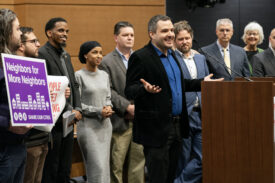Via Erica Barnett, Adam Stein has a fascinating post on San Francisco’s move to start treating parking rationally. Here’s Stein on parking spaces:
…their supply is fixed but the demand fluctuates greatly by day and by hour. For most goods, pricing matches supply with demand. But the price for parking is inflexible. Most spots are free. Others are metered at an artificially low rate. Residential permit parking creates local distortions. Private lots skim those willing to pay the most.
The traditional solution to parking problems is to increase the number of spots available, providing yet another subsidy to drivers and pushing yet another cost onto everybody else… Oversupply of parking encourages driving. Undersupply creates a lottery system in which people circle endlessly looking for a spot, or park illegally. In either case, the result is more congestion, more carbon emissions, and less livable cities.
San Francisco’s solution to the supply and demaind problem is just what you’d expect from a city of left-wing commie radicals: a free market.
The city will deploly variable pricing for parking spaces that will act very much like variable road pricing: it will more efficiently match demand to supply. As the SF Chronicle describes it:
…the city will adjust hourly parking rates based on demand – the price will go up when spaces are scarce and go down when plenty are available. People may be less inclined to drive during peak times if they know it will cost them more.
SFpark won’t stop at tweaking parking rates. It also will adjust time limits. Drivers, for instance, may be allowed to park for no more than an hour in a particular neighborhood commercial district during the day, when shopkeepers benefit from high turnover, but may be able to park longer at night, so they can linger at a restaurant or catch a show. Hours of meter operation might be expanded.
The plan will initially cover about one-quarter of the city, and it comes complete with some techno-groovy inducements that will make it easier to find parking and pay for it.
Personally, I’m just waiting to see how long it takes someone to call San Francisco’s plan “social engineering.” So, I’ll try to beat them to the punch. The way cities currently treat parking policy — like a Soviet bread line with fixed rations, or like a political chit to dole out to vested interests — now that’s social engineering.









Sungsu
Vancouver, BC, sets its meter parking rates so that the hourly rates are comparable to nearby parking garages and lots.
Wells
When Eric uses phrases like, “San Francisco’s solution to the supply and demaind problem is what you’d expect from a city of left-wing commie radicals: a free market”, it leaves me unsure of his ideological leanings. The piece is interesting, but for me, parking arrangements, whether free market or exaggerated social engineering, are not a real solution. Making Seattle walkable is a solution. Arranging the bus lines so they’re more frequent is a solution. Running bus lines to the waterfront and more frequently east/west, that would be a solution. Extending the streetcar line up Seneca to 1st Avenue and back probably on Pike and then 6th Ave to Westlake Blvd –(about 1 mile of track and 3 or 4 stations), that would be a solution. Eliminating many curbside parking spots all together and extending the sidewalks especially at intersections, oh yes, that would be a solution!! But whatever. Seattle is where the nation’s worst transportation engineers go to die.
Quinton Roland
Excellent article! Very informative and thot-provoking. Ssshhh! Don’t tell anyone, but I heard this outrageous rumor that ALL DEVELOPMENT is social engineering, whether it be suburban or urban, high density or low density, smart growth or dumb growth, transit oriented or auto dependent, sustainable or not? All development forces you to adapt your lifestyle to that particular built environment. Some environments “force you to walk.” Some environments “force you to drive.” Some environments “force” you to lead a healthier lifestyle. Some impose higher health risks upon you and your family. For example if they replace a traffic light intersection with one of those new fangled roundabouts, my family and I are forced to travel more safely and more efficiently, and breath cleaner air, and look at center island fountains instead of asphalt, and reduce my tax burden to build and maintain that intersection. There is no place in the civilized world where one can escape social engineering. Either the govt or some developer or the voting population is routinely forcing me to adapt my lifestyle to physical changes. I am actually quite OK with changes (social engineering) that do more harm than good to the community. Life in organized society by its nature must be subject to social engineering. That is our preference. We want it that way. If we want to elude social engineering, we have to go back to the wilderness and fend off lions and bears and others who prefer the laws of nature over the rule of law.
Quinton Roland
Ooops! In my comments above please replace “more harm than good” with “more good than harm.” Thank you 🙂
Matt the Engineer
(wandering off topic with Wells)My favorite cities in Europe have not only walkable downtowns, but car-free downtowns. What’s wrong with getting rid of the cars, relegating them to tall parking lots on the outskirts of the city? In Seattle we could start small, by removing cars from Pike’s market (remind me why we need cars there again?), extend it to parts of 1st, then extend it down Pine (allowing crossing traffic through). Only let streetcars and small delivery cars in.